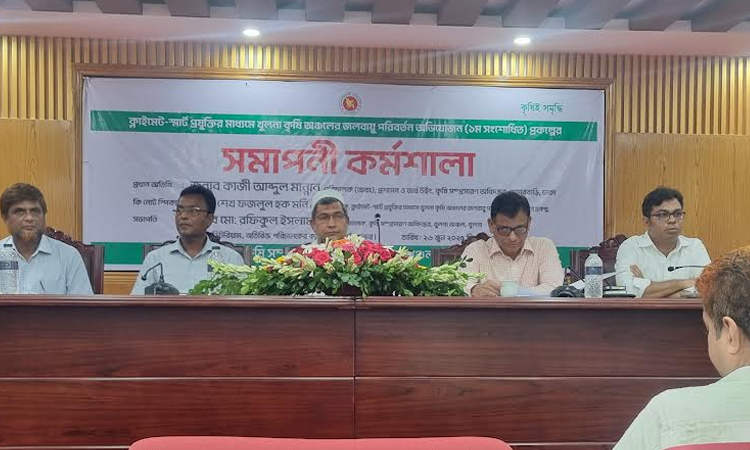News Flash

KHULNA, June 26, 2025 (BSS) - Climate change is having a severe impact on agriculture and rural livelihoods in the Khulna region, speakers said at a workshop here today.
The observations were made during a workshop on the "Climate-Smart Agriculture Adaptation Project in the Khulna Region," held at the office of the Additional Director, Department of Agricultural Extension (DAE), Khulna Region.
Md. Rafiqul Islam, Additional Director of DAE, Khulna, presided over the session, while Kazi Abdul Mannan, former Director (Admin & Finance Wing) of DAE, Dhaka, attended as chief guest.
Project Director Fazlul Haque Moni presented the keynote paper at the event.
Speakers highlighted a range of climate-related challenges that are threatening agricultural productivity and food security in the region.
These include rising sea levels, persistent water-logging, increasing soil salinity, weak polder and communication infrastructure, unplanned shrimp farming, tidal surges and the intrusion of saline water into croplands.
They also pointed to the lack of adequate irrigation and drainage systems, shortages of quality inputs and agricultural labor and salinity during the dry season, all of which have forced vast areas of farmland to remain uncultivated, especially during the Rabi and Kharif seasons.
To address these issues, the government launched the Climate-Smart Agriculture Adaptation Project on October 31, 2021, with a budget of Tk 49.71 crore, approved by the Planning Commission and the Ministry of Agriculture.
The project, which is set to conclude on June 30, 2025, has been implemented across 28 upazilas and two metro areas in Khulna, Satkhira, Bagerhat, and Narail districts.
The project has introduced a variety of adaptive farming techniques such as relay cropping, mixed and intercropping, polythene mulching, Sorjan cultivation and drip irrigation to boost yields and reduce fallow land.
Key areas of focus include improved water management, soil health, land optimization, agricultural mechanization and climate-resilient crop production.
These interventions have enhanced food security and improved farmers' socio-economic conditions by lowering costs, increasing profits, and expanding market access.
The project also promotes climate-tolerant, low-water-demand and high-value crops such as watermelon, summer tomatoes, and beans and has improved crop intensity through better local seed management and irrigation practices.
Speakers emphasized that such initiatives are vital to equip coastal farmers with tools to cope with climate-induced challenges and ensure sustainable agricultural growth in the region.
Agriculture Officers, Upazila Officers and other stakeholders from across the region participated in the discussion.